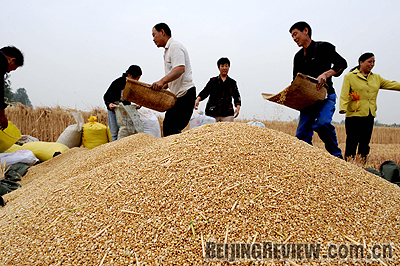|

PILING UP: This summer’s abundant grain harvest could help ease food security concerns in China
Five consecutive years of bumper grain harvests, including an abundant yield this summer, have enabled China to deal with the international food crisis more easily.
Figures from the Ministry of Agriculture indicate the total summer grain output exceeded 120 billion kg, 2.5 billion kg more than last year. While international food prices continue to soar, China's abundant grain harvest will play a role in stabilizing international food prices.
Qiu Jianxin, an expert at the Chinese Academy of Agricultural Sciences (CAAS), told Beijing Review that government assistance has contributed the most to the country's five consecutive years of good harvests.
Addressing food shortages always has been a key task for the Central Government. For the last five years, the first document issued each year by the Central Government has always been related to agriculture. And the government has given consistent political and capital assistance to agricultural development.
The Central Government has adopted a series of favorable agricultural policies during the past five years, including direct subsidies for grain production, fine seeds and machinery. In 2006, it eliminated the agricultural tax to stimulate local governments' interest in promoting agriculture as well as farmers' enthusiasm for growing grains and vegetables. This year, it issued 10 policies to support agriculture and grain production. The government has increased its expenditures on agriculture by 85 percent compared to the amount it spent in 2007.
Qiu said the government is also devoted to improving agricultural production methods by speeding up the pace of mechanization. In 2008, the Central Government increased its subsidies for purchasing farm machinery to 4 billion yuan ($585 million) from 2 billion yuan ($293 million) in 2007, covering all agricultural counties. For instance, the government paid 420,000 reapers for harvesting wheat, 50,000 more than in 2007.
The Central Government has also spent 700 million yuan ($102 million) on promoting agricultural technology and skills as well as new agricultural products. It also is spending 3 billion yuan ($440 million) on subsidizing irrigation and water conservation facilities.
"Because of the above-mentioned factors, China reaped such a big harvest this summer, defying all natural disasters like the blizzards, drought, and earthquakes," Qiu said.
Summer grains usually account for 23 percent of the country's total annual
| 